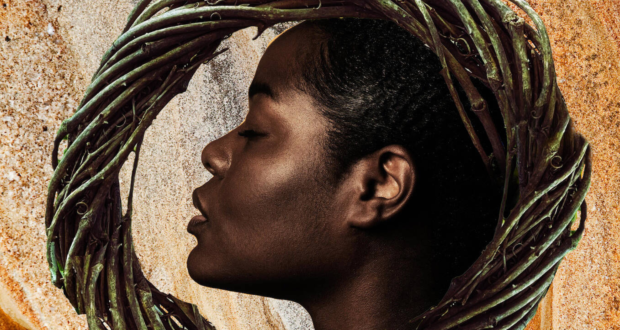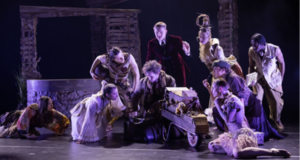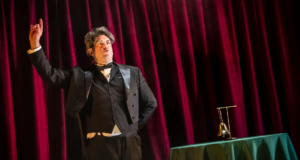An accessible and enjoyable outdoor communion with nature through poetry, movement and music.Summary
Rating
Good
On the grass at Dial Arch Square, Woolwich, an installation woven from willow transforms into a theatre space. Created by disabled artist Oliver McDonald, this circle of natural material is broken only by entrances, and it is within it that Graeae invites an audience of all types and abilities to enjoy a performance about nature and transformation.
This being a Graeae production, accessibility is at the root of everything. Outside the performance area a table is set on which explanatory items allow the audience to explore the show before it begins. A description is made available in varied formats for varied people. Each story is then performed not only through beautiful poetry, speech and movement, but through BSL, and the show is advertised as audio-described. The script introduces foreign words, opening up connections with different cultures. It is even financially accessible; as part of the Greenwich and Docklands International Festival tickets are free, but should be booked in advance.
On entering this egalitarian space, the audience is seated around the grassy arena and a gentle soundtrack of natural noises wash over us: we are immersed in sounds of the sea and birdsong as we await the start of the show, while the willow enwraps us and forms a community. The performance then brings together several stories that describe transformation and relationships, beginning with the growth of a seedling, and which feature messages of communal support.
All of the actors are clearly talented, full of energy and dynamic enthusiasm. Elinor Machen-Fortune as the seedling is delightful, inviting participation from children in the audience with lively encouragement. She is superbly shadowed by Rachael Merry, who plays her role vibrantly, seamlessly signing as she does so. Later, Farrell Cox is especially impressive in the role of the moon, her superb movement truly beautiful to watch, and her audience interaction cheerful and uplifting. The cast work as an excellent ensemble all round, supporting each other and bringing different skills to the table. They have the audience clapping, signing and singing, whilst the soundtrack is at times visceral, resonating through our bodies to create a new interaction. Shared voices, gestures and sounds work effectively to underscore the messages portrayed of helping each other to have belief in oneself.
I was, however, a little unclear as to what age range the show is intended for. There were only a few children in the audience when I attended, yet initially the script seems to lean towards a family-style storytelling. Later though, the poetry and narrative becomes somewhat more complex, the thematic sounds silence and more concentration is required. Here, the children didn’t seem quite as engaged.
Clearly there is some work yet to do on the show, although it is early in the run so there’s time to get up to speed. Some of the actors seemed to still be learning their parts. Additionally, the seating area was not clearly organised, which became distracting. People were turning up in wheelchairs mid performance and were unsure where to put themselves. One carer ended up sitting on the floor in the dust. It would have been helpful to encourage the more mobile customers to the far side, whilst leaving space near to the entrance for latecomers, perhaps with a steward assigned to direct placement.
That aside, this is a pleasant, short production with a talented cast, especially commendable for its accessibility features. It’s a lovely way to spend a summer’s afternoon.
Directed by: Kate Lovell, Sonny Nwachukwu and Britny Virginia Albert
Movement Direction by: Darragh O’Leary
Sound Design by: Oliver Vibrans
Costume & Set Design by: Stephanie Greenslade
Caption Book Design by: Natalie Cooper
Tactile Book Design by: Aofie Barron Flynn
This Woven O plays at GDIF until 4 September. Further information and bookings can be found here.
 Everything Theatre Reviews, interviews and news for theatre lovers, London and beyond
Everything Theatre Reviews, interviews and news for theatre lovers, London and beyond



